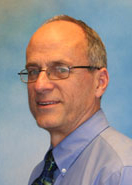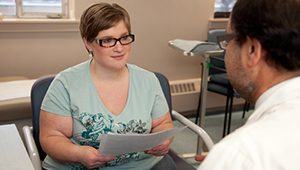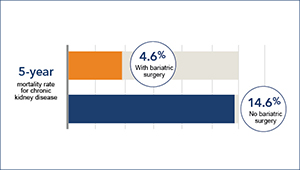Obesity
Research overview
“Obesity is the number-one health problem in the United States because it negatively affects our population’s health more than any other condition,” said Kaiser Permanente Washington Health Research Institute Senior Investigator David Arterburn, MD, MPH. Kaiser Permanente Washington researchers are doing practical research to learn how doctors, patients, families, employers, and policymakers can best work together to prevent and treat obesity.
“We’re focusing on three ways to halt the obesity epidemic,” said Senior Investigator Dori Rosenberg, PhD, MPH. “We’re helping to change obesity-promoting environments, bringing evidence-based prevention and treatment programs into health care systems, and helping people develop lifelong healthy diet and activity habits.”
Kaiser Permanente Washington obesity research areas include:
- reducing sedentary behavior and promoting physical activity and healthy diet in various age groups, populations with chronic conditions, and families;
- shared decision making to help patients find the best way to a healthy weight;
- implementing health coaches in primary care to support behavior changes;
- social networks that support lifestyle change programs;
- relationships between medications and genetic factors in developing obesity;
- health system, community, and national policies that address obesity;
- relationships between obesity and depression, diabetes, and other conditions; and
- long-term benefits and risks of bariatric (weight loss) surgery.
“Obesity is caused by many factors, so at Kaiser Permanente Washington, we’re working on many levels,” said Paula Lozano, MD, MPH, a senior investigator and Kaiser Permanente Washington’s assistant medical director for preventive care. “We’re improving health care to help people who are obese now. But since obesity is a societal problem, we’re also studying how to change our homes and workplaces and neighborhoods to create more healthy environments.”
Recent publications on Obesity
Coleman KJ, Wellman R, Fitzpatrick SL, Conroy MB, Hlavin C, Lewis KH, Coley RY, McTigue KM, Tobin JN, McBride CL, Desai JR, Clark JM, Toh S, Sturtevant JL, Horgan CE, Duke MC, Williams N, Anau J, Horberg MA, Michalsky MP, Cook AJ, Arterburn DE, Apovian CM, PCORnet Bariatric Study Collaborative Comparative Safety and Effectiveness of Roux-en-Y Gastric Bypass and Sleeve Gastrectomy for Weight Loss and Type 2 Diabetes Across Race and Ethnicity in the PCORnet Bariatric Study Cohort 2022 Oct;157(10):897-906. doi: 10.1001/jamasurg.2022.3714. Epub 2022-08-31. PubMed
Chao GF, Yang J, Peahl AF, Thumma JR, Dimick JB, Arterburn DE, Telem DA Comparative effectiveness of sleeve gastrectomy vs Roux-en-Y gastric bypass in patients giving birth after bariatric surgery: reinterventions and obstetric outcomes 2022 Sep;36(9):6954-6968. doi: 10.1007/s00464-022-09063-7. Epub 2022-01-31. PubMed
Buszkiewicz JH, Rose CM, Ko LK, Mou J, Moudon AV, Hurvitz PM, Cook AJ, Drewnowski A Associations between neighborhood built environment, residential property values, and adult BMI change: The Seattle Obesity Study III 2022 Sep;19:101158. doi: 10.1016/j.ssmph.2022.101158. Epub 2022-07-01. PubMed
Cruz M, Drewnowski A, Bobb JF, Hurvitz PM, Vernez Moudon A, Cook A, Mooney SJ, Buszkiewicz JH, Lozano P, Rosenberg DE, Kapos F, Theis MK, Anau J, Arterburn D Differences in weight gain following residential relocation in the Moving to Health (M2H) Study 2022 Sep;33(5):747-755. doi: 10.1097/EDE.0000000000001505. Epub 2022-05-20. PubMed
Coleman KJ, Basu A, Barton LJ, Fischer H, Arterburn DE, Barthold D, Courcoulas A, Crawford CL, Kim BB, Fedorka PN, Mun EC, Murali SB, Reynolds K, Zane RE, Alskaf S Remission and Relapse of Dyslipidemia After Vertical Sleeve Gastrectomy vs Roux-en-Y Gastric Bypass in a Racially and Ethnically Diverse Population 2022 Sep;5(9):e2233843. doi: 10.1001/jamanetworkopen.2022.33843. Epub 2022-09-01. PubMed
Researchers in Obesity
 David E. Arterburn, MD, MPHSenior Investigator |
 Allen Cheadle, PhDSenior Investigator, KPWHRI; Senior Research Associate, CCHE |
 Andrea J. Cook, PhDSenior Biostatistics Investigator |
 Maricela Cruz, PhDAssociate Biostatistics Investigator |
 Nicole M. Gatto, PhD, MPHPrincipal Collaborative Scientist |
 Beverly B. Green, MD, MPHSenior Investigator |
 Mikael Anne Greenwood-Hickman, MPHSenior Collaborative Scientist |
 Paula Lozano, MD, MPHSenior Investigator; Director, ACT Center |
 Dori E. Rosenberg, PhD, MPHSenior Investigator |
 Gregory E. Simon, MD, MPHSenior Investigator |











